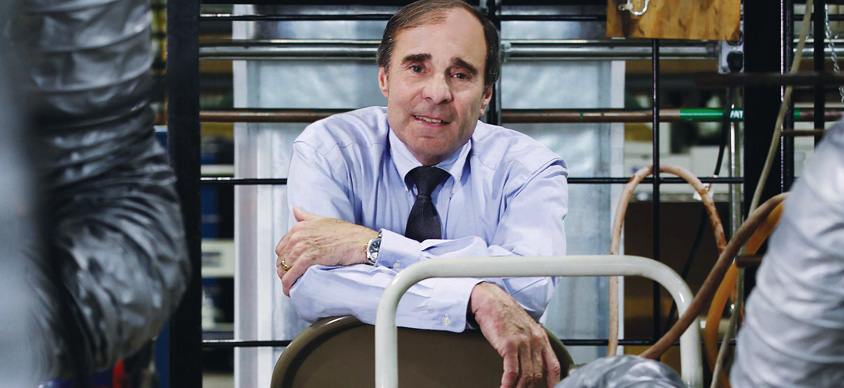Making an Impact, The Sweet Smell of Success, Robert De Simone

Forty-six years ago, Robert Augustine was a Seton Hall chemistry professor overseeing the work of some eight or 10 master’s degree and doctoral candidates. He’d just bought a new home “with about half an acre of ragweed in the yard.” Gazing at it, Augustine wondered whether an extract of ragweed’s essential biochemical element would have any practical use.
One of his students, Robert De Simone, took up the investigation as part of his doctoral dissertation. A cancer cure (the idea behind the study) didn’t pan out, but De Simone’s study of the compounds — what chemists call sesquiterpenes (carbon molecules with the formula C15H24) — led him to a long and illustrious career.
Now, by creating the Robert De Simone Fellowship in Chemistry and Biochemistry with a gift of $100,000, De Simone is strengthening the department and making it possible for promising young scientists to follow in his footsteps.
The co-founder and chief executive of Advanced Biotech, an $80-million company that provides natural flavor and fragrance ingredients to Coke, Pepsi, Kraft Foods and Aveda, De Simone holds 20 patents for synthesizing aroma chemicals that smell good and flavor such household names as Jell-O, Tang, Snapple and, most recently, Monster Energy drinks.
Professor Emeritus Augustine, whose students in the late 1960s dubbed themselves Big Augie’s Mob, isn’t surprised by De Simone’s success. “He always acted like an entrepreneur and did research that was definitely out of the box.”
While still a night student and junior chemist at one of about half a dozen firms where he worked before starting his own, De Simone used his knowledge of sesquiterpenes — a then little-known compound — to develop his first natural commercial compound for an oriental fragrance.
“Bob was one of the strongest students I ever had; not only academically, but in terms of leadership and generosity of his time in a shared collegial research environment,” says Augustine.
The collegiality — within a small environment that’s closely linked to industry — is what appealed to De Simone about Seton Hall’s program, then and now.
“It allows people to conduct research while pursuing a career at the same time. It’s unique.”
It is indeed Seton Hall’s secret for success, agrees Nicholas H. Snow, professor and chair of the Department of Chemistry and Biochemistry. “As perhaps the smallest Ph.D.-granting chemistry department in the nation,” it has distinct advantages in cross-disciplinary team research.
In fact, its collegial research technique is suddenly being imitated by big universities, Snow says.
One current example of how this works is a project to develop “highly water-resistant materials” for industry. Students and faculty from physical, analytical, organic and computational chemistry are working as a team in “what is still a rather unique model” for university research, Snow says.
The De Simone Fellowship will fund this special type of applied learning by supplementing graduate students’ stipends and teaching assistant pay, also making the department more competitive nationally.
This year’s distribution will be used to provide $5,000 supplemental awards to four Ph.D. students based on academic achievement, performance to date in their research, proficiency as teaching assistants and financial need. The recipients were selected by the department chair and director of graduate studies from among current students.
For the chosen four, it will help them complete their research. In fact, next April, when the department holds its annual research symposium, Snow says, “Bob will be able to see the results of the students’ work he has supported.”
Beyond that, the gift’s benefits “will ripple throughout the department,” says Michael Zavada, dean of the College of Arts and Sciences, allowing the department to reallocate funds for other emerging needs.
For this, Zavada is grateful. He notes that De Simone “has always been very generous to the University in time and financial support over the years.” For instance, De Simone sits on the President’s Advisory Council. He also supports North Star Academy, a University-assisted charter school that serves underprivileged youngsters in Newark — particularly in North Star’s push in STEM (science, technology, engineering and math) studies.
“Bob shows the kids you can get a real and interesting job in these fields.”
Certainly, De Simone’s own career has been interesting. He credits his success both to the ragweed plant and his training under Professor Augustine. “I owe a lot to Seton Hall,” he says.


